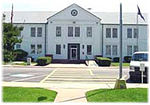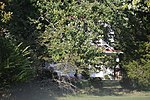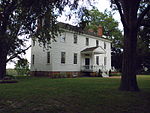Federal Correctional Complex, Petersburg
The Federal Correctional Complex, Petersburg (FCC Petersburg) is a United States federal prison complex for male inmates in Petersburg, Virginia. It is operated by the Federal Bureau of Prisons, a division of the United States Department of Justice. The complex consists of two facilities: Federal Correctional Institution, Petersburg Low: a low-security facility with an adjacent satellite prison camp for minimum-security inmates. Federal Correctional Institution, Petersburg Medium: a medium-security facility.FCC Petersburg is located 25 miles southeast of Richmond, Virginia, the state capital. It lies in the northwesternmost part of Prince George County, just west of Hopewell, Virginia. FCC Petersburg is located in Prince George County, 25 miles southeast of Richmond, Virginia, the state capital. It lies just west of the independent city of Hopewell, Virginia.
Excerpt from the Wikipedia article Federal Correctional Complex, Petersburg (License: CC BY-SA 3.0, Authors).Federal Correctional Complex, Petersburg
Magnolia Road,
Geographical coordinates (GPS) Address Nearby Places Show on map
Geographical coordinates (GPS)
| Latitude | Longitude |
|---|---|
| N 37.296787 ° | E -77.348468 ° |
Address
Magnolia Road
23836
Virginia, United States
Open on Google Maps




